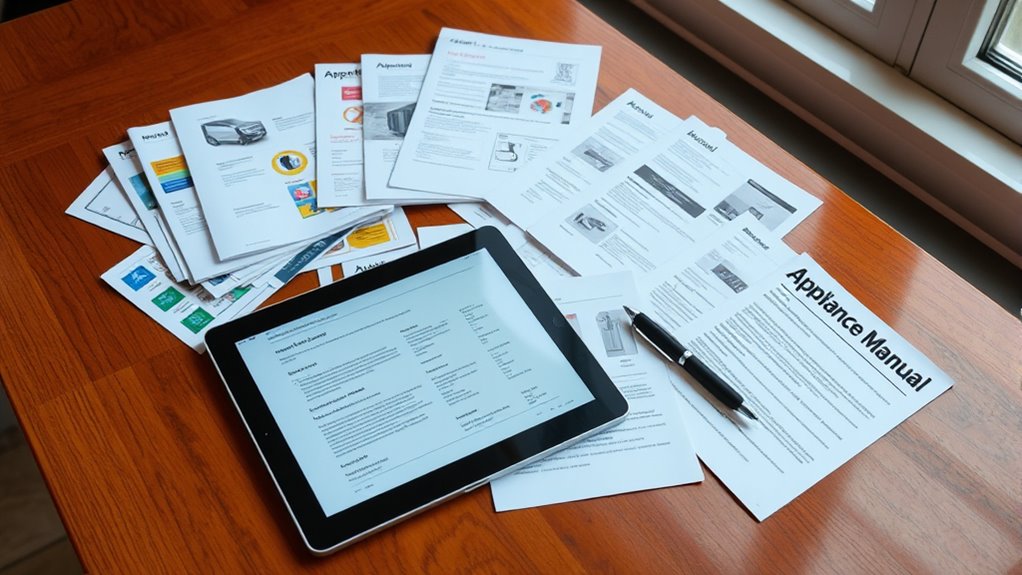To tame the binder for appliance manuals and warranties, start by creating a dedicated storage system with labeled folders or digital files for each appliance. File all manuals and warranty cards immediately after purchase, including receipts. Regularly review and update your files, discarding expired warranties. Keeping everything organized helps you find information quickly, understand coverage, and troubleshoot problems easily. Keep this system maintained, and you’ll save time and hassle whenever appliance issues arise—you’ll discover useful tips along the way.
Key Takeaways
- Create a dedicated, labeled storage system for manuals, warranty cards, and receipts for quick access.
- File documents immediately upon appliance purchase and update files with repairs or warranty extensions.
- Review warranty coverage details, expiration dates, and troubleshooting instructions regularly.
- Use digital scans of documents for backup, easy access, and organization.
- Periodically discard expired warranties and keep files current for efficient appliance management.

Having your appliance manuals and warranties organized can save you time and frustration when issues arise. Instead of scrambling through stacks of papers or searching your digital files, you’ll know exactly where to find the information you need. This simple step guarantees that when your refrigerator stops cooling or your washing machine leaks, you won’t waste precious hours hunting down the warranty details or troubleshooting instructions. Staying organized means you can quickly determine whether your appliance is still under warranty, understand how to troubleshoot minor problems, or decide if it’s time to call in a professional.
Start by creating a dedicated space for all your appliance documents. A labeled file folder, a binder, or a digital folder on your computer can serve this purpose well. As you bring home new appliances, immediately file their manuals and warranty cards in this designated spot. When you do this right away, you eliminate the risk of losing essential information or forgetting which appliance the documents belong to. Be sure to include purchase receipts along with warranty cards, as these often are required when making a claim. If you prefer digital copies, scan the documents and store them in a clearly labeled folder, making sure the files are easy to access.
Next, take the time to review the warranties and manuals for each appliance. Understanding what’s covered and for how long helps you make informed decisions about repairs or replacements. Some warranties cover parts and labor, while others only offer limited coverage on certain components. Knowing these details can save you from unnecessary expenses or surprises when something goes wrong. Additionally, familiarize yourself with the troubleshooting section of the manual. Many common problems are straightforward fixes you can perform yourself, saving you time and money. Mark the warranty expiration date on your calendar or set a reminder, so you’re aware of when coverage ends and future repairs might be out of pocket.
Finally, keep in mind that cookie management and privacy preferences can impact how easily you access digital copies and online warranty registration services, so maintaining control over your browsing settings can streamline your organization process. Maintaining this organized system isn’t a one-and-done task. Every time you purchase a new appliance, add its documents immediately. When you get repairs or upgrades, update your files with any new warranty information. Periodically review your collection—discard outdated or expired warranties, and ensure digital copies are still accessible. By keeping everything current, you make it easier to handle issues promptly and efficiently.
Frequently Asked Questions
How Long Should I Keep My Appliance Manuals for Warranty Purposes?
You should keep your appliance manuals for as long as the warranty is valid, plus a few extra years in case you need to reference details or file a claim later. Typically, this means holding onto them for at least 2-3 years after purchase. Store the manuals in a safe, accessible place, like a dedicated binder, so you can quickly find the information if issues arise or repairs are needed.
Can I Access Digital Copies of Warranty Information Online?
Ever wonder if you can find your warranty info with a quick click? Yes, you can access digital copies online. Many manufacturers offer digital manuals and warranty details through their websites or mobile apps, making it easier to retrieve important info anytime. Just visit the company’s support page, log in if needed, or search your appliance model. This way, you won’t have to dig through paper stacks when you need warranty proof fast.
What Should I Do if My Warranty Claim Is Denied?
If your warranty claim is denied, you should first review the denial letter carefully to understand the reason. Then, gather any supporting documents or evidence that could challenge the decision. Contact the manufacturer or retailer to discuss your case and ask if there’s an appeal process. If needed, escalate the issue by filing a complaint with consumer protection agencies or seeking legal advice to protect your rights.
Are Extended Warranties Worth Purchasing for Appliances?
Yes, extended warranties can be worth it if you own expensive or high-maintenance appliances. They provide peace of mind, covering repair costs that could otherwise be costly. However, you should weigh the warranty’s cost against the appliance’s reliability and typical repair expenses. If the appliance is likely to last long without issues, an extended warranty might not be necessary. Consider your budget and risk tolerance before making a decision.
How Do I Register My Appliance for Warranty Coverage?
Ever wonder how to guarantee your appliance is protected? To register your appliance for warranty coverage, locate the registration card or visit the manufacturer’s website. You’ll typically need the model number, serial number, purchase date, and retailer info. Fill out the registration form online or by mail promptly after purchase. Isn’t it smart to secure your investment early, so you’re covered if something goes wrong later?
Conclusion
By organizing your appliance manuals and warranties, you’re not just tidying up—you’re building a fortress of preparedness. Think of your binder as a trusty shield, ready to defend against unexpected repairs or disputes. When chaos strikes, your well-maintained records become your secret weapon, turning a potential headache into a manageable situation. So, stay proactive; because in the game of homeownership, knowledge truly is your greatest power.









